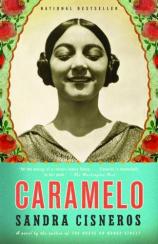Caramelo
Review
Caramelo
CARAMELO, the gorgeous new novel by Sandra Cisneros, begins with a portrait taken on a summer trip to Acapulco, one of those spontaneous group shots offered by photographers who comb the beach to record memories, real or manufactured. All of the members of the Reyes family are there…all except for Lala, the youngest, forgotten a few yards away as she happily makes sandcastles. And so Lala spends the rest of the book painting a portrait of her own.
It's impossible not to love an author who names her characters "the Awful Grandmother," "Aunty Light-Skin" and "Uncle Old." Cisneros's warm, wry humor has been on display since THE HOUSE ON MANGO STREET, and in her latest blended book (equal parts American and Mexican influence), she ensnares us again. This is Lala's story, first and foremost, but it's also the story of so many other things --- of growing up in two cultures, of growing up in general, of family life and daily upheaval, of class and racial strife. The Reyes family travels south to Mexico City each summer to spend time with Inocencio's parents, his heavy-handed mother and henpecked father. Thirteen running, screaming kids caught between the Chicago culture of their daily lives and the Mexican roots of their parents. Three daughters-in-law left to stew in their own juices when mama's around. One hundred reasons why, we soon learn, everything is not OK.
We watch things unfold through Lala's eyes, even the things she was not there to witness. She is an always-precocious narrator. Of Aunty Light-Skin's secretarial job, for example, we're told that she wears beautiful cocktail dresses and high heels, and is picked up each day by her big-shot boss. Lala overhears her mother and aunts' ridicule, but does not spell out the details. Readers can draw their own conclusions about Aunty's "profession." Our narrator admits her unreliability --- she remembers things that didn't happen, forgets some that did, and puts others into a different context. Of a disagreement with her mother, she pictures a dusky confrontation. But Lala knows it took place during the day.
Lala also guides us through history. She tells the Grandmother's story, how she became "Awful," before she became proud. She tells of her grandfather's great lost love, who was most certainly not her grandmother. She fills holes with her own romantic notions, adding details and drama where before there were none (in an amusing twist, the Awful Grandmother plays the interrupting listener, questioning Lala's every interpretation and insisting that her granddaughter play up the love story). Through Cisneros's beautiful prose, the Awful Grandmother becomes vulnerable: "It was dizzying to decide one's fate, because, to tell the truth, she'd never made any decision regarding her own life, but rather had floated and whirled about like a dry leaf in a swirl of foamy water."
When the Reyeses move from Chicago to San Antonio in Lala's 14th year, her life only becomes more complicated. So much the better for the reader. Cisneros's footnotes, explaining Mexican cultural references and character background, alone are worth the read. Lala endures the usual miserable adolescence, and Cisneros captures her petulant voice right down to the apostrophes: "The two guys in suits think we've stolen something. I mean, how do you like that? 'Cause we're teenagers, 'cause we're brown, 'cause we're not rich enough, right?"
Cisneros has said she began CARAMELO as a short story, but it kept growing. The semi-autobiographical work offers a lesson in Mexican history as well as in how to tell "healthy lies" --- the ones that don't hurt anyone. The significance of the title surfaces many times over. It's the color of the rebozo left to Lala when her grandmother dies; the skin of the servant girl who gives Lala a later-in-life epiphany; the mixed heritage of a Mexican-American family that remembers "a country I am homesick for, that doesn't exist anymore, that never existed." This fictional work of nonfiction turns out to be mainly fiction after all. Lala tells too many healthy lies to make it otherwise.
It's impossible not to compare Cisneros's multigenerational tale to THE HOUSE OF THE SPIRITS or ONE HUNDRED YEARS OF SOLITUDE, but unlike Isabel Allende or Gabriel Garcia Marquez, Cisneros's magic comes from actual realism. Each word is a brushstroke. Lala's story is one of construction, and truth, and consequence, but ultimately one of memory. As her grandfather is once told, "Remembering is the hand of god. I remember you, therefore I make you immortal." Just try not to remember Lala Reyes and her colorful family history. Cisneros has painted quite a picture.
Reviewed by Toni Fitzgerald on January 21, 2011
Caramelo
- Publication Date: September 9, 2003
- Genres: Fiction
- Paperback: 464 pages
- Publisher: Vintage
- ISBN-10: 0679742581
- ISBN-13: 9780679742586



